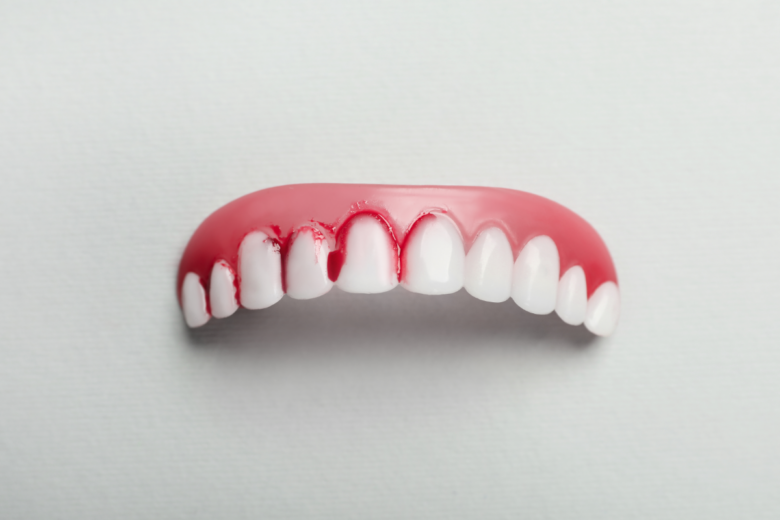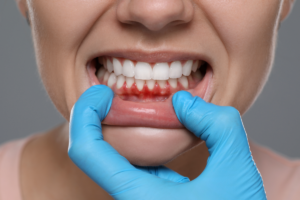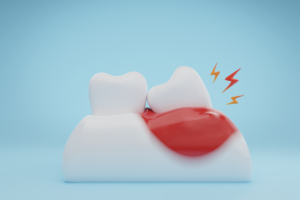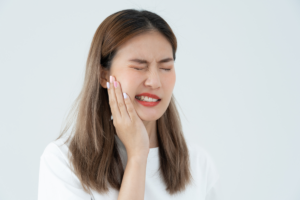Bleeding gums can be a sign of various issues, ranging from something as simple as improper brushing to more serious conditions like gum disease. If you’re experiencing this, you’re not alone. Many people struggle with gum bleeding at some point in their lives. The good news is that there are ways to stop it quickly, and even better, steps you can take to prevent it from happening again in the future. Let’s dive into how you can handle gum bleeding and keep your gums healthy!
One of the most common causes of gum bleeding is poor oral hygiene. When plaque builds up along the gumline and isn’t removed through regular brushing and flossing, it can irritate the gums and lead to inflammation. This inflammation can make the gums more prone to bleeding, especially when brushing or flossing. Other factors, such as smoking, certain medications, or hormonal changes, can also contribute to gum problems and increase the risk of gum disease. Identifying the underlying cause of your bleeding gums is the first step in determining the right treatment and prevention strategies.
Fortunately, there are several ways to stop gum bleeding and prevent it from recurring. Regular and gentle brushing with a soft-bristled toothbrush, using floss correctly, and incorporating mouthwash into your routine can all help reduce plaque buildup and keep your gums healthy. Additionally, visiting a dentist for professional cleanings and regular checkups is essential for maintaining gum health and addressing any potential issues before they become more serious. With the right approach to oral care, you can significantly reduce the risk of gum bleeding and ensure that your gums remain strong and healthy for years to come. Let’s explore the best practices and tips for managing and preventing bleeding gums effectively!
Introduction to Gum Bleeding
What Causes Gum Bleeding?
Bleeding gums often occur when plaque builds up along the gum line, causing irritation and inflammation. This leads to gingivitis, a mild form of gum disease. But there are other causes, too, such as:
- Brushing too hard
- Flossing aggressively
- Hormonal changes (like pregnancy or menstruation)
- Vitamin deficiencies, especially Vitamin C and K
- Poor-fitting dental appliances, like dentures
Understanding the cause of your bleeding gums is essential to finding the right treatment. Sometimes, a quick fix is all you need, but if the problem persists, it may indicate an underlying health issue.
Why Should You Take Gum Bleeding Seriously?
Ignoring bleeding gums might seem harmless at first, but untreated gum bleeding can lead to more serious issues like gum disease (periodontitis), tooth loss, and even heart disease. Gum inflammation is a warning sign your body gives you, urging you to take action before things worsen.
Effective Immediate Remedies for Bleeding Gums
Saltwater Rinse
One of the simplest and most effective ways to stop your gums from bleeding quickly is by rinsing your mouth with warm saltwater. The salt helps reduce inflammation and promotes healing. Here’s how to do it:
- Mix half a teaspoon of salt in a cup of warm water.
- Swish it around your mouth for about 30 seconds, making sure it reaches the gum line.
- Spit it out, and repeat up to three times a day.
Saltwater rinses are natural, easy to do, and offer quick relief.
Cold Compress for Quick Relief
Applying a cold compress to your cheek near the affected area can help reduce swelling and numb the pain, leading to immediate relief from bleeding gums. Wrap ice cubes in a cloth and apply the compress for 10–15 minutes, several times a day.
Long-Term Solutions to Prevent Gum Bleeding
Proper Brushing and Flossing Techniques
Improper brushing or flossing can be a significant cause of bleeding gums. Always brush your teeth gently using a soft-bristled toothbrush, and use a light touch when flossing. Make sure you’re brushing for two minutes, reaching all areas, and flossing between each tooth.
A proper technique goes a long way in preventing gum bleeding in the future.
Choosing the Right Toothbrush
The type of toothbrush you use can make a big difference. Opt for a toothbrush with soft bristles to avoid irritating your gums. Also, consider switching to an electric toothbrush, which can be gentler on your gums and more effective at removing plaque.
Foods That Help Stop Gum Bleeding
Vitamin C-Rich Foods
Vitamin C is essential for gum health, as it helps your body repair tissues and fight infection. If you have bleeding gums, increasing your intake of vitamin C can be very beneficial. Try eating foods like:
- Citrus fruits (oranges, grapefruits, lemons)
- Berries
- Bell peppers
- Spinach and kale
Anti-Inflammatory Foods
Incorporating anti-inflammatory foods into your diet can also help. Foods like ginger, turmeric, and omega-3 fatty acids (found in salmon, walnuts, and chia seeds) have natural anti-inflammatory properties that help reduce gum swelling and bleeding.
When to See a Dentist for Bleeding Gums
Persistent Bleeding
If your gums continue to bleed despite home remedies, it’s time to schedule a visit to your dentist. Persistent gum bleeding could indicate a more serious condition like gum disease or a blood clotting disorder. The dentist can evaluate the cause and recommend the best course of treatment.
Signs of Gum Disease
If you notice other symptoms, such as gum recession, tooth mobility, or persistent bad breath, it may be time for a professional assessment. Early-stage gum disease is treatable, but advanced cases may require more intensive treatments like scaling and root planing.
Natural Remedies to Aid Gum Healing
Aloe Vera for Gum Health
Aloe vera is not only great for sunburns but also helps soothe and heal gum tissue. It has anti-inflammatory properties and promotes healing. You can apply fresh aloe vera gel directly to your gums or use it as a mouthwash.
Turmeric as a Healing Agent
Turmeric is another natural remedy with strong anti-inflammatory properties. It can help stop bleeding and promote healing. Mix turmeric powder with water to make a paste, and apply it to your gums for 5–10 minutes before rinsing.
Maintaining Good Oral Hygiene
Brushing Twice a Day
The most crucial step in preventing gum bleeding is consistent oral hygiene. Brush your teeth twice a day to remove plaque, food particles, and bacteria. This helps prevent the buildup of harmful substances that can lead to gum irritation and bleeding.
Regular Dental Checkups
Visiting the dentist regularly (at least once every six months) is essential for maintaining good gum health. Routine cleanings and exams will help prevent plaque buildup and catch any gum problems before they become serious.
Dealing with bleeding gums can be uncomfortable, but with the right steps, you can stop the bleeding quickly and take preventive measures for the future. Remember, maintaining good oral hygiene, using proper techniques, eating the right foods, and seeing your dentist regularly are all key to keeping your gums healthy. If your symptoms persist, don’t hesitate to consult with a professional to ensure your gum health is on track.
Incorporating the right oral care habits into your daily routine is essential for preventing gum bleeding and maintaining overall gum health. Regular brushing with a soft-bristled toothbrush, gentle flossing, and the use of mouthwash can help remove plaque buildup and reduce the risk of gum disease. It’s also important to avoid habits that can irritate the gums, such as aggressive brushing or smoking, both of which can exacerbate gum issues. Furthermore, a well-balanced diet rich in vitamins and minerals, especially vitamin C, can support gum health and help prevent inflammation.
Visiting your dentist for regular checkups and professional cleanings is another crucial aspect of gum care. Dentists can detect early signs of gum disease and provide treatments to address any issues before they escalate. They can also offer guidance on proper brushing and flossing techniques to ensure you’re getting the most out of your oral hygiene routine. If you’re experiencing persistent gum bleeding, it’s important to consult with a dentist, as they can rule out serious conditions and recommend appropriate treatments tailored to your needs.
In conclusion, while bleeding gums can be a warning sign of oral health problems, it’s a condition that can be managed with the right approach. By prioritizing good oral hygiene, a healthy diet, and regular dental visits, you can significantly reduce the risk of gum disease and keep your gums in optimal condition. If you notice persistent bleeding or other concerning symptoms, don’t wait to seek professional advice—early intervention can make all the difference in maintaining a healthy, pain-free smile.




